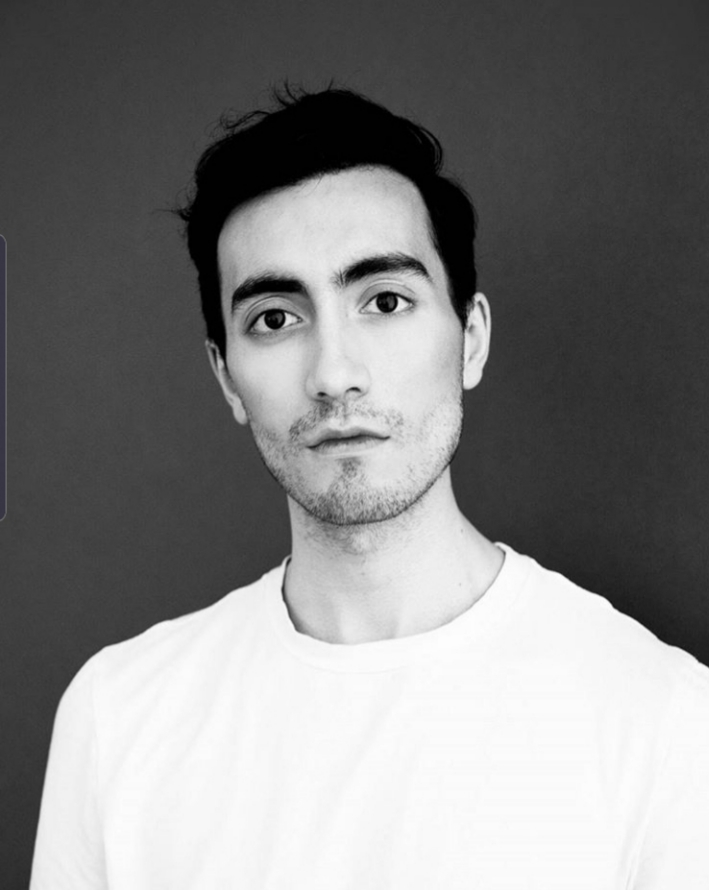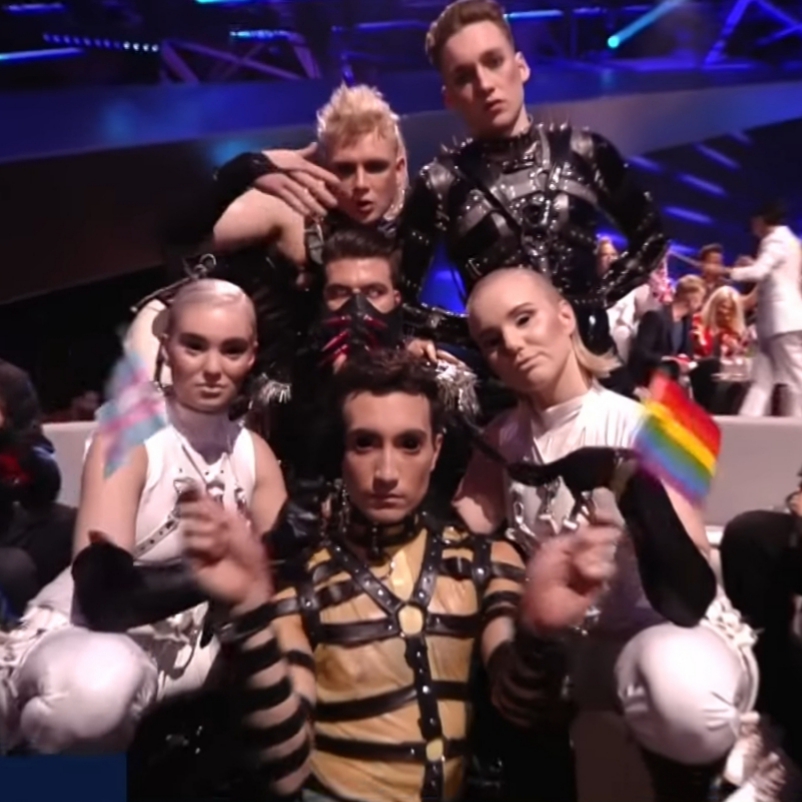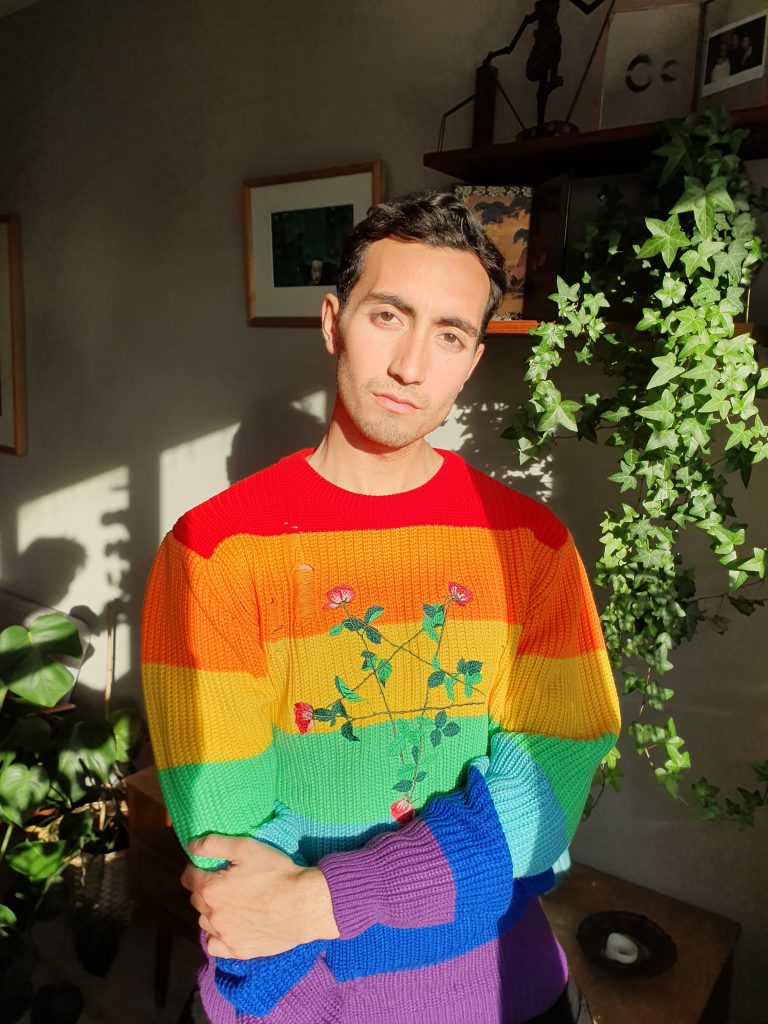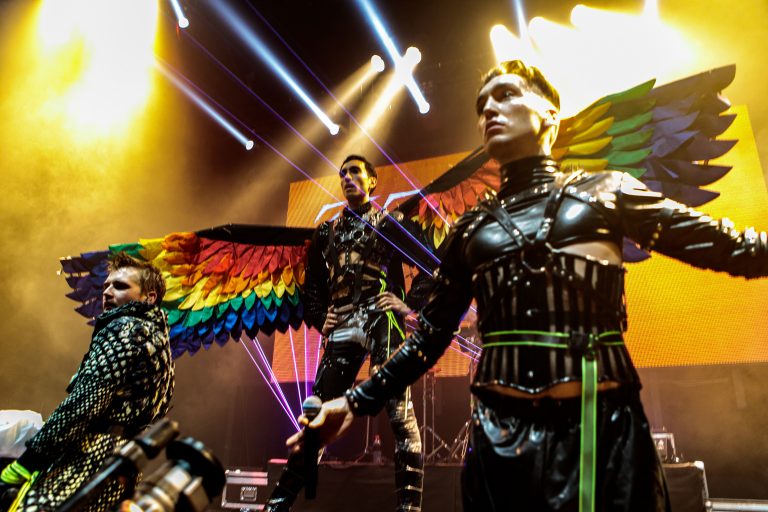After bringing their anti-capitalist BDSM techno music and performance art to Eurovision earlier this year, Hatari again made international headlines last month when one of their dancers opened up an enormous pair of rainbow wings during the band’s show in Moscow, Russia.
Andrean Sigurgeirsson, a choreographer and dancer with Hatari, unveiled the rainbow wings during the band’s encore performance of their song Hatrið mun sigra. Gay Iceland spoke to Andrean about the story behind the rainbow wings, the journey to Eurovision, and his life beyond Hatari.
‘Stepping into the darkness’
 Andrean says he only began performing with Hatari after he was approached by the group as a whole, lead singers Matthías Haraldsson and Klemens Hannigan, and dancers Ástrós Guðjónsdóttir and Sólbjört Sigurðardóttir whom he’s known since school, and Einar Hrafn Stefánsson drummer and producer of the group, when they decided they were going to enter into competition to represent Iceland at Eurovision.
Andrean says he only began performing with Hatari after he was approached by the group as a whole, lead singers Matthías Haraldsson and Klemens Hannigan, and dancers Ástrós Guðjónsdóttir and Sólbjört Sigurðardóttir whom he’s known since school, and Einar Hrafn Stefánsson drummer and producer of the group, when they decided they were going to enter into competition to represent Iceland at Eurovision.
“They thanked me so much for this little act of waving the rainbow flag. And then I remembered, shit, this is such a political flag.”
“I originally was going to boycott Eurovision like so many people, but when I heard about their song and their thought behind it, I was just sold,” Andrean says. “Since RÚV, The Icelandic National Broadcasting Service, was not going to boycott, I rather wanted to see a song that uses the opportunity to raise awareness of the multiple human rights violations of Israel towards Palestine and the hypocrisy of hosting a competition which unites people in a country that divides. I wanted a better way of protesting the paradox of it being held there.”
When he’s not performing with Hatari, Andrean is a dancer with the Iceland Dance Company, where he performs primarily contemporary dance. He says it wasn’t hard to make the transition between dancing for the national company and working with the techno-punk band.
“The artistic director now is Erna Ómarsdóttir, and we do a lot of her stuff. We do a lot of using the voice, and it’s a very dark world with a lot of screams. So stepping into the darkness is nothing new,” he says.
Andrean says it was also easy to work with Hatari because he has always incorporated politics into his art. “I’m always trying to find the balance between activism and art,” he says. “Whether it be dance or any art genre, I feel like it’s always the strongest if you can use your art to protest or to open a conversation about something.”
‘A huge impact’
Since performing at Eurovision, Hatari has garnered a worldwide following. “I actually wasn’t expecting anything,” Andrean says about the band’s popularity. “I wasn’t doing this for a following or anything of that sort. I was just doing it for the vision of it and the purpose of it. But of course when you do an act like that, of course you would get attention and some sort of fame.”

When asked about why he thinks such a large queer following has developed around the band, Andrean points to Hatari’s strong homoerotic imagery. Their performances and music videos are replete with whips and chains and leather-clad, scantily dressed men. “And then I come in with all of my flair,” he adds.
Andrean says there was one particular moment at Eurovision when he felt the band’s queer following began to crystallize. “I was waving the rainbow flag in the green room during the semi-finals,” he explains. “Every single second they were recording in the green room, there I was waving the rainbow flag. And it had a huge impact.”
Af the semi finals, Andrean says he was bombarded by messages from fans on Instagram. “Most of them came from Eastern Europe, especially from Russia, Poland,” he says. “They thanked me so much for this little act of waving the rainbow flag. And then I remembered, shit, this is such a political flag. In Iceland, thankfully, waving the rainbow flag is becoming very normal. But many countries participating in Eurovision, LGBT+ rights are not advanced, or even being undermined and rolled back. The rainbow flag symbolizes the rights and freedoms won, but continues to be a powerful symbol of struggle and hope for equality.
That was actually the sprout of the idea that ended in the wings.”
‘I never felt secure’
When he found out the band would be going to Russia, Andrean began thinking of a way to make a statement during the performance. “I had to find a way to make it interesting and make it very clear as well,” he says. “And then I just thought of Courtney Act on RuPaul’s Drag Race when she had her crazy wings.”
Andrean says the plan was concocted and the wings were built very last minute. His friends Haraldur Leví, a prop designer, and Alexía Rós, a seamstress, helped him pull off the idea. “I picked it up at four in the morning just before I went to the airport,” he says. “I didn’t expect it to be so beautiful.”
“I was very scared actually,” Andrean says about the lead-up to the show in Moscow, since he was traveling alone to Moscow, while the boys were in St. Petersburg performing.. “I believed in this act and I really wanted to do this, but I felt like I had contraband in my bag. I felt like anything could happen. I never felt secure, and I was always expecting the worst.”
It wasn’t until Andrean made it to the venue that he says he felt he could finally relax. “I felt straight away that the people working at the venue were open minded and also seeing the boys made me feel more secure,” he says, referring to Mattíhas, Klemens and EInar.
No one knew that Andrean would be coming to Moscow with Hatari, so he says he made sure that he stayed backstage and kept the wings a secret. “As soon as I came on stage to perform Klámstrákur with Klemens, I just felt the glow of love,” he says. “As I looked over the crowd I saw all of these small little rainbow flags popping up. It was beautiful.
“I just remember when I was prepping my wings I was buckled up, I had to take a big breath, because I was like, maybe I’ll be shot.”
In the encore we did Hatrið mun sigra, and that’s where I decided I wanted to put the wings up, at the very end in the power pose. I just remember when I was prepping my wings I was buckled up, I had to take a big breath, because I was like, maybe I’ll be shot, you never know,” he explains. “But then I just went up and spread my wings and people screamed and cried and cheered for a very long time. It was just a very beautiful communication of love.”
‘A lot of fire in me’

After leaving Russia, the band flew to Helsinki. “I just wanted to kiss the ground,” he says. “But at the same time, I felt very conflicted and bad, I kind of had this diplomatic immunity of being foreign and using my voice. I had the privilege of walking out of this situation, unlike the discrimnated LGBT+ community in Russia.
I talked to some of the fans backstage and at the concert they were dressing colourfully and in harnesses and stuff, but they all wore big coats so they could drift into the night without being seen. Because being different is a risk in Russia,” he explains. “It reminded me that a lot of fights have been fought in the past for us to live freely and unafraid.”
Going forward, Andrean says he hopes to continue making statements with his art. “Not only do I have a platform to do it, but I also have the freedom to do it.” he says. “People that have the privilege and are not using their voice to help others — I think that’s not right.”
Andrean, who is half Indonesian, says he’d especially like to make art that addresses the politics of that country. “The LGBT community in Indonesia is under a big threat,” he explains. “So that’s also a ground that I’d like to step on.”
“I still have a lot of fire in me that I want to express, either with Hatari or by myself.”


